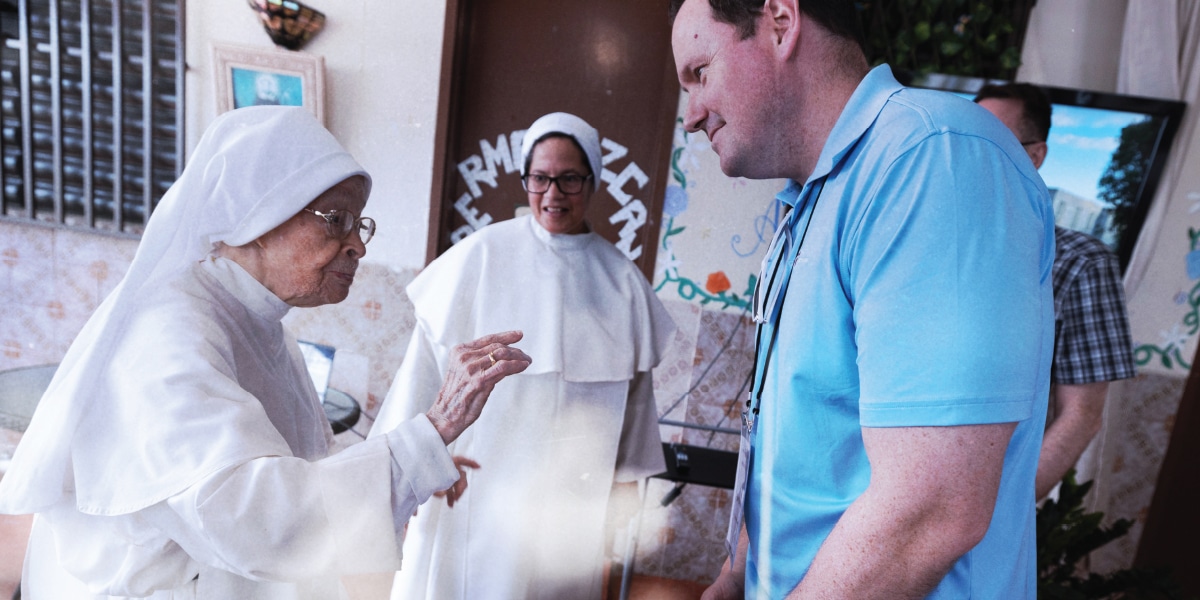Contrary to traditional adult-child relationships, this mom presents a gentle parenting method rooted in child liberation theology, which calls for respecting and empowering children.
It had been one of those days. Nothing was going right. The house was a mess, I had a headache, the day had been long, and my husband, Zach, was having to work overtime that evening. Bedtime was up to me, and I was at the end of my rope.
I was rocking Savannah, my 1-year-old, while Sophia, my 3-year-old, was supposed to be slipping on pajamas but got distracted playing with her dolls. Pajamas still in a wad on the floor beside her, I felt the anger, frustration, and exhaustion that had been simmering in me all day finally bubble to the surface. I harshly reminded my toddler to get into bed.
I instantly felt guilt, but the rage didn’t dissipate until Sophia looked at me, and with nothing but compassion in her sweet, blue eyes said, “Mommy, you are using an unkind voice. Is something wrong? Here, let’s take deep breaths together.” And with her little toddler hands—not even half as big as my own—she grasped my hand and started to breathe deeply.
How had my 3-year-old not only remained calm in the midst of my chaos, but also recognized that I was struggling and needed to regulate my own body and emotions? Whenever she was experiencing big feelings, she wasn’t punished or shamed for it. Zach or I would instead help her regulate her emotions through hugs, deep breaths, sitting with her through it, and eventually talking it out. We tried our best to approach tantrums and outbursts with curiosity and compassion, and now that I was, in a sense, having my own tantrum, Soph reacted in the same way.
This particular incident was a turning point for me where I realized that gentle parenting was more than another strategy of behavior modification. It was a way of being with children that respected them as a whole person in such a way that they would naturally learn respect and empathy for others.
When the norm in a household is kindness, respect, grace, gentleness, and compassion, children are equipped to be confident in their own worth and the worth of others, even if a member of the family temporarily steps outside of the household norms. My daughter wasn’t afraid of my outburst, nor was she afraid to let me know that I was speaking “unkindly” to her. She knew she deserved respect while also respecting me in the midst of my own big emotions.
But there is even more to it than that. We shouldn’t just teach children respect because it models empathy and kindness. We shouldn’t just respect children because their brains are still developing. Ultimately, it all boils down to this: We should respect kids because it is their right to be respected.
A Different Message
Yet, almost every time I picked up a book on Christian parenting, a very different instruction was given. In some way or another, most of these Christian parenting books communicated a similar message:
• Your children are corrupt and sinful from the moment of birth.
• You must teach your children instant obedience to your every command.
• Children must be punished, often through pain, in order to learn right from wrong.
• God commands children to respect the authority of their parents, and parental authority gives parents the right to rule over their children.
These messages deeply disturbed me, even when I was only beginning to learn the ropes of parenthood. It seemed to me that the messages being communicated to Christian parents were those of power and control, not ones that revolved around the fruits of the spirit.
I’ll never forget the first time I read the widely popular Christian parenting book To Train Up a Child, by Debbie and Michael Pearl, originally published in 1994. As I turned each page, I felt more and more astonished at what the authors touted as genuine Christian parenting. In one memorable chapter, the authors state: “Prove [to the child] that you are bigger, tougher, and more patiently enduring and are unmoved by his wailing. Defeat him totally. Accept no conditions for surrender. No compromise. You are to rule over him as a benevolent sovereign. Your word is final.” It was at this point that I put the book down to process what I had just read as the words of Christ echoed in my head over and over: “Whatever you do for the least of these brothers and sisters of mine, you do for me.”
Could I imagine “defeating” Christ? Would being “unmoved” by the wailing and crying of Christ be right? Would I “rule over” Christ “as a benevolent sovereign”? If I could not fathom treating Christ in this way, how could I rightly act this way toward my children? Are children not also included as the brothers and sisters of Christ?
As I read those words, it became incredibly clear to me: Much of what has been popularized as proper Christian parenting doesn’t actually have a lot to do with Christ, but rather, it has a lot to do with power. This worship of power by the parents is antithetical to the message of Christ—of a God who willingly forsook power and glory for the sake of all humanity. I knew in my heart that there must be another way. My Christian parents did not raise me this way. I did not want to raise my children this way. Christian parenthood did not have to look like this. In fact, I deeply believed that honoring Christ meant running far from this punitive model of parenthood. That is when I discovered the concept of child liberation.
Child Liberation Theology
When I first stumbled upon the term child liberation theology, I was immediately intrigued. I had heard of the liberation theology of Peruvian theologian Gustavo Gutiérrez in which he emphasized the Christian duty to the poor and suffering, and Christ as the redemptive figure of the marginalized. I had also heard of various other liberation theologies, including Black liberation theology, womanist liberation theology, Indigenous liberation theology, LGBTQ+ liberation theology, and more. But I had never once heard of or even considered a theology of liberation for children.
When I first picked up the book Suffer the Children: A Theology of Liberation by a Victim of Child Abuse by Janet Pais, I could not put it down. My eyes scanned each page as my body was filled with a feeling of excitement and purpose. Finally, while not a parenting book by any means, here was a book that addressed the topic of parenting and children from a Christian perspective that advocated for the dignity and rights of the child and advocated against domineering parental control. Through her theology of liberation for children, Pais affirmed the dignity of children as made in the image of God and challenged the norms of how children are treated by adults.

As I learned more about this, I wondered, “How does this line up with Franciscan theology?” At the time, my evenings after my children went to bed were spent studying, reading, writing, and completing assignments for my master’s degree in Franciscan theology. My day-to-day life was often filtered through a Franciscan lens as I studied and applied what I was learning to what I was experiencing. This was no different. I became engrossed in the topic of child liberation, and the more I considered it, the more I realized that it aligned with the Franciscan vision of the call to, as Francis proclaimed, “follow in the footsteps of Christ” in all that we do.
There are several fundamental beliefs held within child liberation theology:
1) Children are born good, not tainted with evil or original sin.
This fits with the positive view of humanity held in Franciscan theology—that God intended for every human being to exist, that existence is only born out of divine desire and the outpouring of God’s overflowing love, and that sin does not change the fundamental goodness of humanity. Yes, human beings sin (children included!), but sin does not change who we are at our core: good creations made by a good creator. How could assuming the goodness of children affect our interpretation of their behavior?
2) Children deserve dignity and respect and should be empowered instead of oppressed.
This goes right along with the Franciscan commitment to uplifting the poor, marginalized, and oppressed. Sts. Francis and Clare were committed to this. If children are being oppressed, then addressing and challenging this oppression is deeply Franciscan. How could a deep, Franciscan commitment to challenging oppression move us to examine how our actions may perpetuate oppression in our own homes, schools, and elsewhere in our society?
3) Adults must critically examine how adult power is misused in order to control children in unnecessary ways.
St. Francis, like Jesus, modeled a voluntary giving up of power for the sake of the other because Francis believed that all people are called to follow in the footsteps of Christ. It is this voluntary giving up of power and control that must be committed to for the sake of child liberation. We must replace a “power-over” mindset with a “responsibility-toward” mindset. What would it look like to counterculturally lay down our own power for the sake of our children like Francis did for the sake of the most vulnerable in his life?
Honor Children, Honor God
Ultimately, child liberation theology includes the radical idea that the misuse of power by adults over children not only dishonors children who are all made in the image of God, but also dishonors God. Just as Sts. Francis and Clare believed that we honor God by honoring those around us, the same is true of the way we treat children. To honor God, we must honor children, and to truly honor children, we must examine the ways that we may, knowingly or unknowingly, cause them harm and treat them as less than.
Each time a parent chooses to respond to children in a respectful way—getting on their level, seeing the world through their eyes, being mindful of their developmental capabilities, and showing them grace and love—they are leaning into the reality of the Gospel. When a parent stands against the cultural norms that say a child must suffer in order to learn and instead chooses to teach the child in a way that honors their humanity and stage of development, that parent is modeling the countercultural nature of both Jesus and Francis, who likewise affirmed the dignity of the most vulnerable.
To parent according to the truth of the Gospel is to parent in a way that respects the dignity of the child and to recognize that the child is just as worthy of respect, grace, and love as any adult. The Gospel invites us to reconsider our views on punishment, status, and power, and likewise invites us to live into the reality of the love through which we were created. If we are to parent in light of the Gospel, we must rethink the traditional adult-child relationship and work to cultivate relationships with the children who have been entrusted to us based on mutual respect and truly unconditional love.
Parenting That Is Christlike
In the widely circulated Gospel Coalition article “Is Gentle Parenting Biblical?”, the claim is made that gentle parenting, while having some good qualities, ultimately is not biblically based. The author states, “If we want to produce gentle children, we’ll need more than gentle methods—we’ll need biblical ones.”
To parent with the fruits of the spirit with unconditional love, patience, gentleness, and self-control is to parent biblically. To lay down our power, to refuse to use harsh punishments for every mistake, to refuse to exert our strength to cause physical pain to the child, to refuse to shame and isolate, and to refuse to treat the child as a piece of clay that can be molded however we desire is to model our parenting after the humility and vulnerability of Christ. So yes, I do believe that gentle parenting is not just biblical, but Christlike.
Every time I think back on the story of my daughter, I am reminded that gentleness can indeed foster gentleness. Sophia showed me that day that children will emulate what is modeled. She displayed the fruits of the spirit far better than I did on that night, which is not something that can be ordered or forced in any genuine way. She was gentle, patient, and loving in her response to my outburst. She gave me the opportunity to practice humility and repair, and she gave me the gift of forgiveness. There was grace amid hurt, growth amid mistakes, and patience amid tension.
In a faith that prizes forgiveness, grace, and vulnerability, I must ask: What could be more Christian than that?








